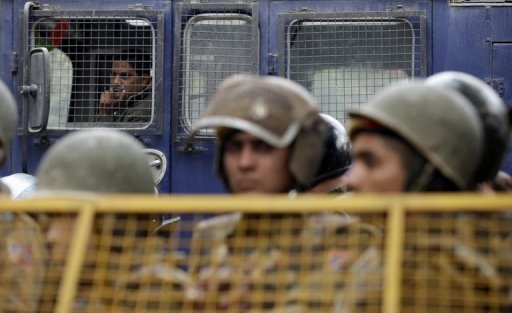MANAMA: Shia protesters in Bahrain are increasingly heading back to the streets, nine months after a brutal security crackdown was thought to have silenced their democracy movement.
While protests inside purely Shia villages have barely stopped, youths who say they have nothing to lose are now trickling out, some carrying the scars of the mid-March crackdown.
This has been happening despite King Hamad’s promise of reforms in response to a critical international probe, including forming a panel to implement its recommendations.
During the past few days, Shias gathered along the Budaiya highway linking their villages with the capital’s Pearl Square, where protesters had camped out for a month before being beaten back by security forces boosted by Gulf troops.
The protesters, who considered the square their version of Cairo’s Tahrir, hoped to bring down the Al-Khalifa dynasty just as Egyptians forced out veteran president Hosni Mubarak in February.
But the square is no longer there, as the Sunni-led government razed it shortly after chasing protesters out and cornering them in their villages.
Instead it was turned into a junction named Al-Farooq, the title of one of the most revered Sunni historical figures, Omar bin Al-Khatab.
"Occupying Budaiya highway is a preparation to head to Pearl Square… which became a symbol for democracy," human rights blogger Yousif Al-Muhafda said during one protest.
"This is a revival of the uprising that actually never stopped in the villages," he said shortly before riot police arrived, fired tear gas and chased demonstrators out.
Many of the protesters feel they have nothing to lose after a large number of them were dismissed for their jobs, kicked out of universities, or spent months in jail.
"Here, nobody cares about death, because we are only nominally alive," said Fatima Ibrahim, draped in the traditional black abaya cloak.
The protesters echo the slogans heard at Pearl Square.
They want a constitutional monarchy under which the prime minister would be elected, replacing Prince Khalifa bin Salman Al-Khalifa, an uncle of King Hamad who has been in office for 40 years.
This would effectively end the Al-Khalifa control over the island that they have ruled for some 250 years, as the Shia Al-Wefaq formation which had the largest single bloc in parliament before quitting would have the strongest say.
"Our demands remain the same: the government has to be sacked, and the electoral constituencies should be redrawn," said Al-Wefaq former MP Hadi Al-Mousawi.
Shias, who account for about 60 percent the 569,000 population of Bahraini origin, have always complained that constituencies were demarcated in way that reduced their potential larger representation in the parliament.
"It is not an option that people go back home without achieving anything," said Matar Matar, also a former MP of Al-Wefaq, in a clear reference to the losses incurred in the crackdown.
The death toll from the unrest reached 35 including five security personnel and five detainees who were tortured to death, while hundreds were injured, according to the findings of the Bahrain Independent Commission for Inquiry.
The report that was released last month by the panel commissioned by the king, also said 11 other people were killed after the events of February and March.
It concluded a total of 2,929 people were detained during the protest movement, and at least 700 remain in prison.
"There is a policy of revenge against those who took part in protests," said Matar, who himself spent few months in detention after he lost his parliamentary immunity when Al-Wefaq’s bloc resigned in protest against the violence used against demonstrators.
But for Sunni cleric Abdullatif Al-Mahmud, the renewed protests are just "attempts to exacerbate the situation."
"These are proof that they want to impose their will on the whole country," said the head of the National Unity Assembly formed in the wake of protests, mobilizing Sunnis in fear of a Shia takeover.
Mousawi, however, insisted the protest movement cannot back down, while authorities have reached the maximum they can do in terms of repression.
"The popular force generated in February and March has to continue and not retreat," while oppression "will not be useful," he told AFP.
"We will not give up… and we insist that we remain peaceful," he added.
He said that while there were Shias who call for the regime’s fall and others who just want reforms leading to a constitutional monarchy, they all agree on a peaceful approach.
"None of them oppose the democratic approach, through going to a referendum," he said.
Al-Wefaq has already organized several mass rallies inside Shia villages with authorization from authorities after the semi-emergency law declared by King Hamad in March ended in June.

